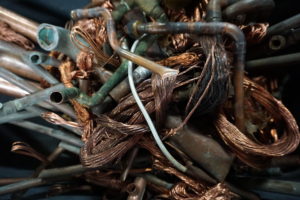We’re celebrating a big milestone in 2021: Miller Recycling is proud to be a 30-year member company of the Institute of Scrap Recycling Industries. For me, reaching this point is a gratifying reminder of how long we’ve been helping our clients with their recycling needs. (Of course, Miller Recycling has been around for much longer than 30 years; we’re a fourth-generation company that was started in 1942 as Frank Miller & Son!). ISRI covers a wide range of scrap recycling, including electronics, glass, paper and plastic, and to mark this anniversary, we’re taking a closer look at the impact of scrap metal recycling.
If you’re not familiar with ISRI, it’s the premier trade association for the recycling industry. ISRI member companies can take advantage of training and educational resources that help us stay current with industry advancements and regulations. Our ISRI membership has also allowed the Miller Recycling team to network with industry leaders, be among the first to learn about technological advancements and develop new strategies for handling scrap and serving our clients.
Another reason we’re proud to be a longstanding member of ISRI is the association’s focus on sustainable development. One of ISRI’s mission is to educate the public about the critical importance of scrap recycling. As we celebrate 30 years of ISRI membership, I think it’s a natural time to reflect on the role of scrap metal recycling within global sustainability efforts.
The Environmental Impact of Scrap Metal Recycling
 From a business owner’s standpoint, the benefits to scrap metal recycling are obvious: There can be a lot of money to be made from recycling useful scrap. If your business generates a lot of scrap, it’s a no-brainer that you would choose to turn that metal into cash instead of letting pickers take it away for free or potentially having to pay to dump that scrap in a landfill.
From a business owner’s standpoint, the benefits to scrap metal recycling are obvious: There can be a lot of money to be made from recycling useful scrap. If your business generates a lot of scrap, it’s a no-brainer that you would choose to turn that metal into cash instead of letting pickers take it away for free or potentially having to pay to dump that scrap in a landfill.
But if you’re only thinking about the financial benefits to scrap metal recycling, you may be unaware of your own contributions to environmental efforts.
Mining for metal ore has done profound damage around the globe. Mining contributes to deforestation and soil erosion, and can destroy vulnerable natural habitats. The chemicals used during the mining process can have devastating effects on soil and water quality in surrounding areas, making these areas potentially dangerous for the people and animals who live there. Mining also generates a tremendous amount of carbon emissions, contributing to rapid climate change.
Instead of further depleting our planet’s limited natural resources, metal recycling transforms materials that have already been extracted from the earth. Minimizing energy consumption is a major environmental benefit to recycling scrap metal. It generally takes far less energy to transform existing metal than it does to mine and process new metal.
Plus, recycling scrap metal keeps this bulky material out of landfills. That’s important for a few reasons. The more waste that’s dumped in landfills, the faster those landfills are filled up and new ones must be opened. And because some kinds of metal scrap have been treated with chemicals that can leach out into the surrounding soil and water supply, leaving metal to sit in landfills for years and years can be highly dangerous for the surrounding communities.
If you’d like to know more about the environmental benefits of scrap recycling, here are just a few stats from the EPA:
- “Recycling steel and tin cans saves between 60 and 74 percent of the energy used to produce them from raw materials.”
- “According to the Steel Recycling Institute, steel recycling in the United States saves the energy equivalent to electrical power for about one-fifth of American households for one year.”
- “One ton of recycled steel saves the energy equivalent of 3.6 barrels of oil and 1.49 tons of iron ore over the production of new steel.”
Another powerful reason to recycle scrap metal? Unlike paper and plastic products, which may be recycled just a few times before degrading, many kinds of metal can be recycled indefinitely. The scrap metal piling up on your property right now could be processed and transformed into something new dozens of times over the coming decades.
As we look ahead to the next 30 years, Miller Recycling is here to help with all your scrap metal recycling needs. We aspire to make recycling not just the most cost-effective way for companies to dispose of their scrap metal, but also the easiest.
I’m always happy to answer any questions you have about our ISRI membership or scrap metal recycling. Contact me today.

